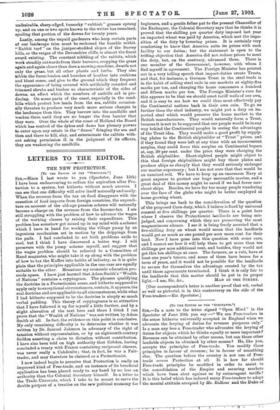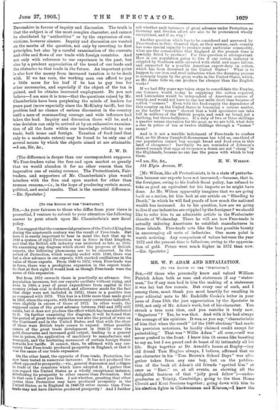[TO THE EDITOR OP THE "SPECTATOR.") SIR,—In a note to
the letter signed " Open Mind" in the Spectator of June 20th you say :—" We are Free-traders in the sense hitherto universally accepted in England when we advocate the levying of duties for revenue purposes only." Is a man any less a Free-trader who advocates the levying of duties for objects which he thinks equally or more important? Revenue can be obtained by other means, but can those other laudable objects be obtained by other means P He, like you, accepts the principles of Free-trade. You modify these principles in favour of revenue ; he in favour of something else. The question before the country is not one of Free- trade versus Protection at all. It is how far should Free-trade principles be modified in order to assist in the consolidation of the Empire and securing markets which have been shut against us by extravagant tariffs ? It is this belief which has induced many Free-traders to adopt the mental attitude accepted by Mr. Balfour and the Duke of . Devonshire in favour of inquiry and discussion. The truth is that the subject is of the most complex character, and cannot be elucidated by " authorities " or by the expression of con- victions, however sincere. Inquiry and discussion are wanted on the merits of the question, not only by reverting to first principles, but also by a careful examination of the currents and ebbs and flows of our trade with foreign countries. And not only with reference to our experience in the past, but also by a prudent appreciation of the trend of our trade and the obstacles to that trade in the future. An important point is also how the money from increased taxation is to be dealt with. If we tax corn, the working man can afford to pay a little more for his loaf if he has to pay less for other necessaries, and especially if the object of the tax is gained, and he obtains increased employment. Do you not believe—I am sure it is true—that the questions raised by Mr. Chamberlain have been perplexing the minds of leaders for years past (more especially since the McKinley tariff), but the problem had no chance of serious discussion in the country until a man of commanding courage and wide influence had taken the lead. Inquiry and discussion there will be, and a wise decision can only be arrived at by an exhaustive examina- tion of all the facts within our knowledge relating to our trade, both home and foreign. Taxation of food (and that only to a moderate extent) may be found to be only one of several means by which the objects aimed at are attainable.
- am, Sir, &c.,
J. W. D.
The difference is deeper than our correspondent supposes. We Free-traders value the free and open market so greatly that we would abandon it for no other reason than the imperative one of raising revenue. The Protectionists, Fair- traders, and supporters of Mr. Chamberlain's plan would interfere with the free and open market for other than revenue reasons,—i.e., in the hope of producing certain moral, political, and social results. That is the essential difference.
— ED. Spectator.]























































 Previous page
Previous page